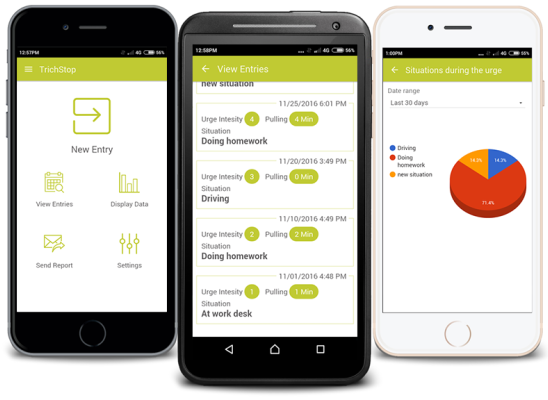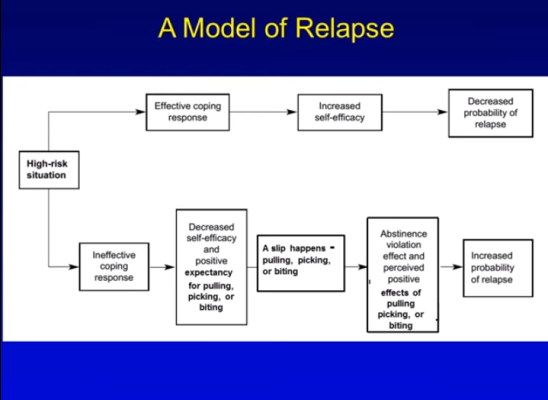Trichotillomania: Will internet-based treatment help if you’ve been in therapy before?

Online test
Find out the severity of your symptoms with this free online test
 The short answer is yes. For a variety of reasons, many people with trichotillomania do not get treatment. Those who do sometimes have negative experiences which causes them to stop treatment. Internet-based therapy and support is a promising way to reach those people with trichotillomania who do not have access to face to face therapy or who do not feel comfortable sharing their experiences face to face. A recent study showed that no matter the symptom severity or treatment history internet-based treatment is still effective.
The short answer is yes. For a variety of reasons, many people with trichotillomania do not get treatment. Those who do sometimes have negative experiences which causes them to stop treatment. Internet-based therapy and support is a promising way to reach those people with trichotillomania who do not have access to face to face therapy or who do not feel comfortable sharing their experiences face to face. A recent study showed that no matter the symptom severity or treatment history internet-based treatment is still effective.
Seeking treatment
The decision to get treatment for trichotillomania is a difficult one. One of the biggest barriers for people is the embarrassment and shame if the condition. Another barrier is not knowing that symptoms are treatable and not knowing where to go for treatment. Therefore, less than 50% of those with a hair pulling disorder get treatment and sometimes it takes up to 9 years after hair pulling starts to get treatment. Often, people with a hair pulling disorder also experience anxiety and depression and it tends to get worse the longer treatment is delayed (2). If someone with a hair pulling disorder goes for treatment, often it is to a mental health professional who does not have experience working with clients who have body-focused repetitive behaviors, so they offer treatment for the anxiety or depression and not the main issue.
When someone goes for treatment a mental health professional who does not work with body-focused repetitive behaviors, treatment ends up not helping because the main issue is ignored. Or maybe trich behaviors are treated negatively making the treatment experience negative. Those negative treatment experiences will likely prevent someone from seeking future treatment.
Working with body-focused repetitive behaviors is a clinical specialty. Therapists are trained to recognize the intricacies of these behaviors and additional issues surrounding them such as anxiety, depression, embarrassment, and shame. Working with a knowledgeable therapist can take a lot of pressure off someone who is going to a therapist for the first time. Mental health providers who are not trained to work with people who have body-focused repetitive behaviors can misdiagnose or create treatment plans that do not address hair pulling behaviors. Experts can be difficult to find due to the low prevalence of these disorders, but the internet is making it easier to find qualified professionals.
Internet therapy
The good news is that the internet opens up access to expertly trained professionals. They often provide teletherapy, individual sessions through online video and connections to online support networks. Internet-based cognitive behavioral therapy has been found to improve symptoms for those with anxiety and depressive disorders (1). Even if someone has had treatment before, it can still help.
What treatment includes
The gold standard for trichotillomania treatment is a combination of behavioral therapy, cognitive therapy, and social support. Medication can be helpful depending on the type of trichotillomania that someone is experiencing. Whether someone pulls hair unconsciously or consciously, treatment includes developing awareness of habits and triggers and then finding ways to counter habits and triggers. Social support is important to help decrease the amount of embarrassment and shame experienced by someone going through recovery.
Will internet therapy help?
Internet-based therapy can be just as effective as in-person therapy. It does not matter if you’ve been in treatment before. According to a recent study, one’s history previous treatment has no effect on the outcome of Internet-based therapy (2). The point is reaching out for help in whatever form you can.

Don’t give up
Trichotillomania and other body-focused repetitive behaviors are mental disorders that usually last a lifetime, cycling in and out of symptom severity. Everyone experiences symptoms differently, which means therapy needs to be as unique as the client seeking treatment. There is research that continues to support cognitive behavioral interventions, and with the guidance of expert therapists, someone can learn to manage the triggers and symptoms of trichotillomania. Recovery is a whole-person, whole-lifestyle effort not only dealing with behavior management, thought management and emotional regulation, but also dealing with the effects of shame, embarrassment, and stigma. Connecting with others who struggle with hair pulling provides a network of encouragement, education, information, and ideas. (3)
Seeking treatment can be a scary process and the internet opens up a huge variety of effective treatment options. A qualified therapist can help you figure out the best combination of whole-person therapy that will be right for you, but whatever you do, keep exploring your options until you find something that works for you. When something works, keep it, but when things don’t work, keep trying.
References
1 Arnberg, F. K., Linton, S. J., Hultcrantz, M., Heintz, E., & Jonsson, U. (2014). Internet-delivered psychological treatments for mood and anxiety disorders: A systematic review of their efficacy, safety, and cost-effectiveness. PLOS One, 9(5), 1-13.
2 Weidt, S., Bruehl, A. B., Designore, A., Zai, G., Kuenburg, A., Klaghofer, R. & Rufer, M. (2017). Trichotillomania: The impact of treatment history on the outcome of an Internet-based intervention. Neuropsychiatric Disease and Treatment, 13, 1153-1162.
Online test
Find out the severity of your symptoms with this free online test
Start your journey with TrichStop
Take control of your life and find freedom from hair pulling through professional therapy and evidence-based behavioral techniques.
Start Now



